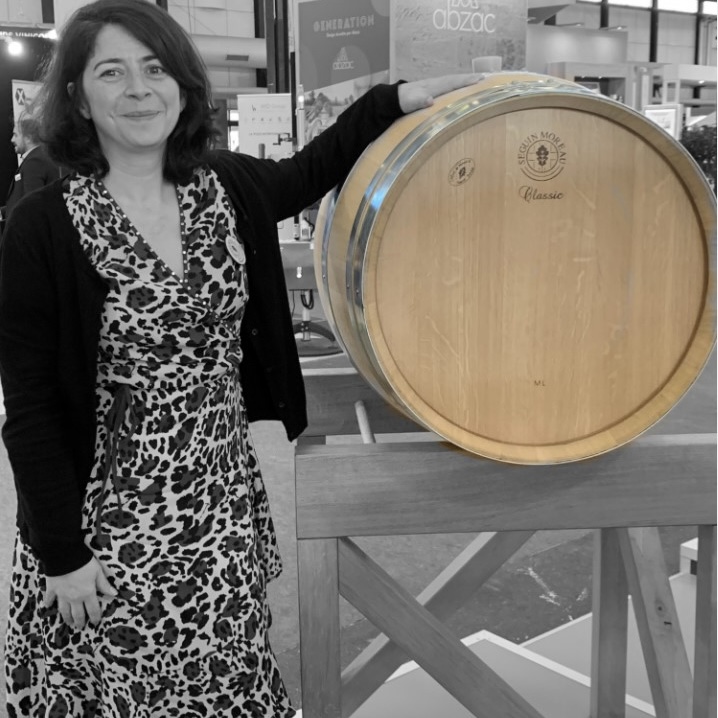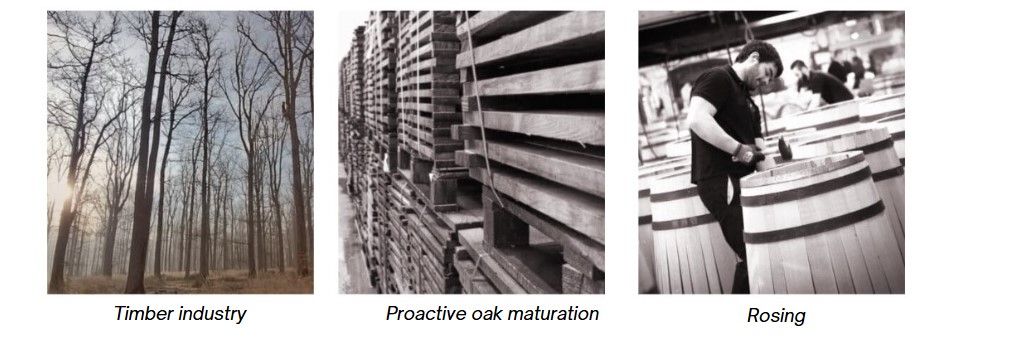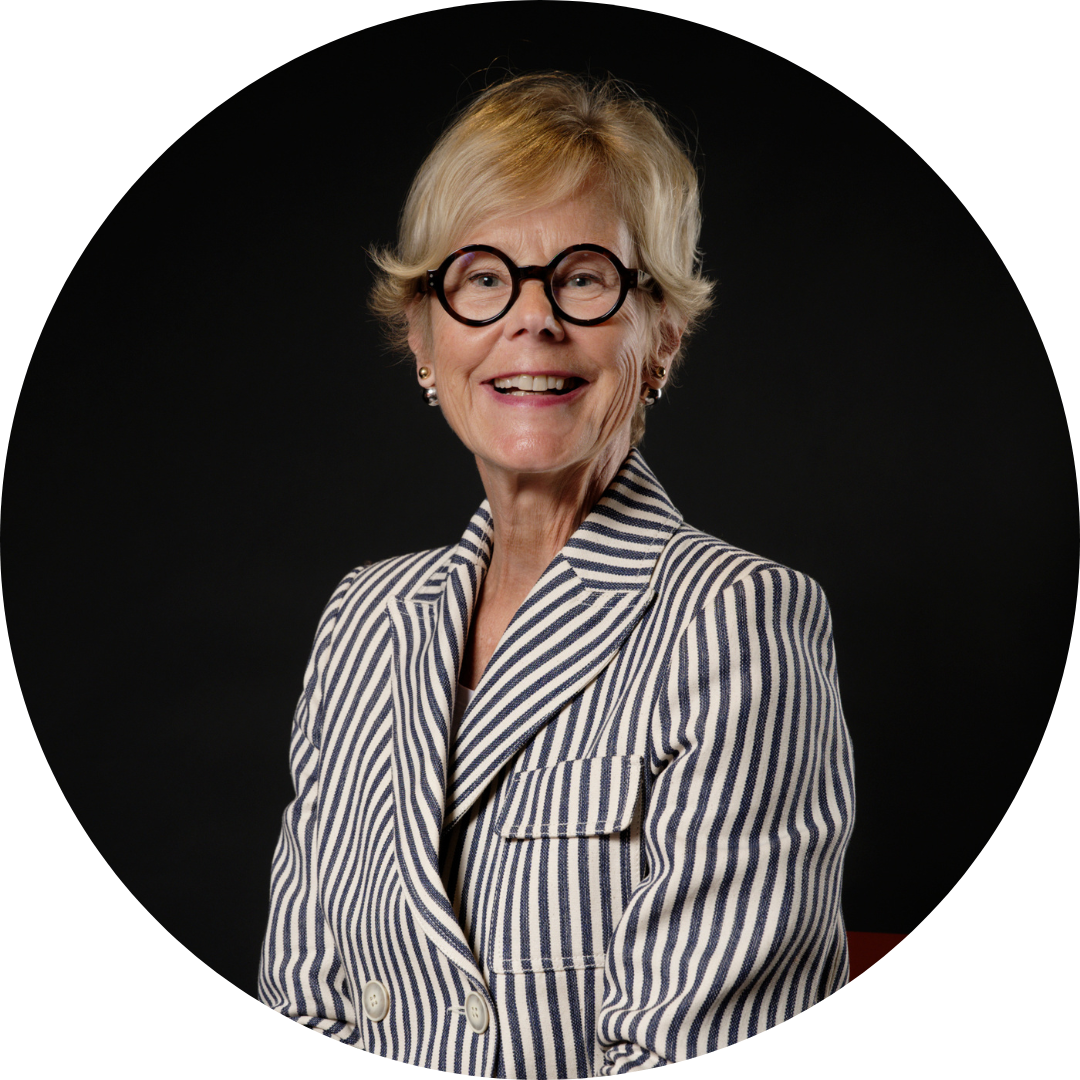Secrets de Caves
Magdeleine Allaume
CEO Seguin Moreau
President of the Fédération des Tonneliers de France
Current Situation
Gerda : What are the main challenges facing you today?
Magdeleine Allaume : There are three challenges. The first is wood. In France, we have access to an exceptional resource: oak, with two main varieties, including Quercus petraea, used in cooperage. This species, which takes at least 150 years to grow, is essential for making barrels. Unfortunately, like many other species, it is suffering from global warming. We are working with the ONF (National Forestry Office) to guarantee the renewal of this resource and to promote silviculture that respects oak. Over the last three years, many oak trees have withered, particularly as a result of droughts such as the one in 2022. These trees are dying prematurely, gradually losing their leaves, a very visible phenomenon in the forest. These ‘slow dying’ trees can still be used for certain industries, but not for cooperage. They are too poor organoleptically and too brittle.
For our barrels, we need wood that is livelier, rounder and fuller, to accompany the wine as it matures. This challenge requires close cooperation with the ONF to replant species in more resilient areas, sometimes in the north, to avoid the extreme heat of the south. Research also shows that a diverse forest is more resilient. When oak coexists with other species, a natural balance is established: the trees protect each other, consume water and nutrients differently, and grow at different rates. So, even though forestry is not directly our business, we support these efforts, informing and collaborating with those involved.
G : Does this also seem to be linked to your role as President of the Fédération des Tonneliers de France?
MA : Yes, and in a way these issues overlap, because they concern both an industry and a brand. So that’s the first issue.
The second issue is passing on the trade. Our business is very manual, and we train young people mainly via a CAP, like the one based in Cognac. We have an outstanding apprentice training centre, where we take on between 4 and 7 apprentices every year. Passing on know-how from the old to the young is essential. At Seguin Moreau, we’re particularly proud of this, because we have a workshop specially dedicated to apprentices. Here, they learn to work with traditional cooperage tools before moving on to the main workshop, where they are supervised by a tutor and learn about the modern technologies of our trade. It’s also a human challenge: our trade is physically demanding. We are therefore actively working to mechanise the most demanding stages of the process, to protect the health of our coopers. We have extraordinary, versatile and talented craftsmen, and it’s a real pleasure to work with them every day. The human challenge lies in preserving our teams and renewing the generations by attracting young people to this exciting profession.
The third challenge is to support the winegrowers, our customers, in the necessary evolution of their style or in the adjustments they wish to make in the face of global warming. Today’s wines are often warmer, sometimes with a more pronounced ripeness, and the wine, as it matures, reflects these changes. In a way, winemaking and ageing inherit the vagaries of the climate, the potential difficulties, but also the opportunities. Some years are more harmonious and richer, while others are more complex.
Each vintage is unique. Ageing brings a degree of consistency, while allowing the winemaker to add his own signature to what nature has provided. At Seguin Moreau, we attach great importance to this aspect. We have a wide range of wines and work with great precision every year to adjust the toasting, the wood, the grain and the size of the containers. This allows us to offer an ageing process that perfectly matches the unique characteristics of each vintage.
G: Doesn’t this pose any timing challenges? In September or October, it’s difficult to know exactly how the vintage will turn out.
MA : Yes and no. Many customers adjust or complete their orders at the last minute. For example, once fermentation is complete, some contact us to ask for barrels with more toast. We can really be a tool for adjustment, fine-tuning choices during maturation. It’s essential for us to be at the service of the winemakers and support them in refining their vision.
G: The wine world is going through a complex period for a variety of reasons. Today’s consumers seem to prefer fresher, less oaky wines that are ready to drink young. How are you adapting to these changing tastes?
MA : Wood is not just about woodiness. We can produce barrels that offer a very discreet aromatic imprint, while being very effective at oxygenation and structuring. They add body and texture, which are essential for making a fine wine. There is often confusion between barrels and woodiness. A barrel is not just an aroma; it’s much more than that. It can contribute organoleptic characteristics, but its main role can be to structure the wine, without imposing a strong aromatic imprint. This is an essential nuance to understand.
Personally, I think that many consumers are unaware of the wine ageing process and the role of wood. We often hear, ‘Oh, this wine is too woody. However, in blind tastings, wines aged in wood are often preferred to their non-wood equivalents. This shows that there is a real need for education, and this is also part of our mission as coopers. Well-used wood doesn’t just taste like wood. It can enrich the aromatic palette, but above all, it brings structure, roundness, silky tannins and well-controlled oxygenation. It’s crucial to re-explain what wood ageing is. There is still a lot of confusion between the taste of wood and barrel ageing, partly because of an era when wine styles were very extracted and marked by wood.
G: Yes, with, for example, wines aged 100% in new oak?
MA : Yes, but we can work differently. We don’t make wine for the winemaker. However, if the winemaker explains his intentions to us, we can adapt the barrel perfectly to meet his expectations.
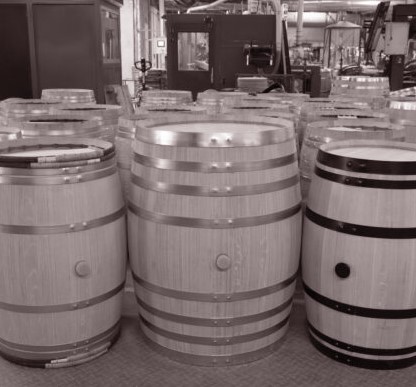
Innovation & Sustainability
G: What are the major recent innovations in cooperage?
MA : We are one of the cooperages with the most patents. Recently, we launched a barrel called ‘Element’, which offers an extremely light toast. It can be fired or steamed, which minimises the barrel’s aromatic footprint. It’s an innovation that’s perfectly in tune with today’s expectations, and it delivers excellent results.
In collaboration with the ISVV (Institute of Vine and Wine Sciences), we have also developed a barrel called ‘QTT’. Thanks to the identification of a specific molecule, this barrel brings a beautiful roundness and a remarkable silkiness to wines with a powerful tannic structure. It is particularly well-suited to long ageing and is already very popular with a number of our customers.
These innovations truly embody the DNA of Seguin Moreau. For over 30 years, we have been working with the ISVV in Bordeaux, where we have seconded two researchers. Our work consists of identifying the molecules that have an organoleptic impact on the wine. This enables us to select wood not only according to its origin, but above all according to its chemical composition and what it can contribute to the wine. Ten years ago, this approach enabled us to launch our ‘Icone’ range, an analytical selection. More recently, it led to the creation of the ‘QTT’ barrel. As we move forward, we are always discovering new molecules that help us to orientate the wine according to the winemaker’s expectations.

G: Do you work exclusively with French wood?
MA : We have a range of European and American woods to complement our French oak range. In both cases (French and American), we work the wood ourselves in our stave workshop. In the United States, we are based in Kansas, and in France, we have facilities in the east of the country and in the Dordogne. This enables us to support winegrowers all over the world.
G: The traceability and durability of wood are becoming increasingly important for consumers and producers. How do you manage this aspect at Seguin Moreau?
MA : The fact that we split the wood ourselves makes traceability much easier, because we start directly from the ‘log’, i.e. the trunk of the tree, in the jargon of the trade. We use a barcode system: as soon as our buyer selects a trunk in the forest, a barcode is immediately affixed to it, and we follow the wood through every stage of its transformation. When we sell a barrel, we can trace the exact origin of the wood used. This end-to-end traceability is made possible by our total control of the different stages of production. This is one of our strengths, and we attach great importance to it. Our customers are very sensitive to the origin of our wood, and for us, it’s essential to be able to provide them with this information.
G: Do you help your customers to resell their barrels or perhaps recycle them?
MA : Yes, we can do that. We have a reconditioning workshop in Cognac, for customers who want to reposition ‘second-hand’ barrels, buy new and free up space. We check these barrels, then sell them on to other customers looking for a mix of new and old wood. Being based in Cognac also offers us many opportunities in the world of spirits, where the second-hand barrel business is significant.
G: On your website, you talk about ‘aiming for excellence in energy efficiency.
MA : Yes, that refers to energy efficiency. We are working hard on CSR initiatives. For example, we calculated our carbon trajectory in 2019, then again in 2022, and we are currently doing so. Our aim is to carry out a full assessment every two years.
In five years, we have reduced our carbon emissions by 11%. We’ve achieved this thanks to a simple, pragmatic action plan. People often think that CSR initiatives are complex, but they can be translated into concrete actions. For example, we have completely covered our cooperage in Napa with solar panels, because electricity in the United States is very carbon intensive. If we want to improve our carbon footprint, we have to start by reducing our consumption of carbon-based energy. This installation, completed two years ago, means that we are now 80-90% self-sufficient in electricity, which is something we’re very proud of.
We have also modernised our cooperage in Cognac, installing a double-flow air circulation system to recover heat. We have also been using a biomass boiler for some time now, which consumes the wood dust sucked up by our system. This boiler room heats the offices, technical areas and much more. These commitments are reflected in concrete initiatives. They are also accompanied by innovations. For example, we have designed a barrel with only four hoops instead of six, because in our carbon footprint, steel carries a lot of weight. Steel can certainly be recycled, but not indefinitely. This reduction in raw materials enables us to limit our environmental impact.
These projects create a dynamic within the company. When initiatives like these are implemented, they act as a catalyst for new ideas. We are currently working on using solar water heaters to heat the water to 70°C, which is needed to test the barrels for leaks, so that we no longer need to use gas.
All this is possible thanks to our young teams at Seguin Moreau, who are creative and fully aware of the challenges of tomorrow. They bring ideas to the table, and we’re used to seeing good initiatives through to the end. This positive dynamic is a real driving force. Being creative is part of our DNA, whether it’s for the design of our barrels or for more industrial aspects, such as buildings or water management. Creativity runs through every layer of the company.
G: It’s a great job.
MA : Yes, and it’s a bit of a paradox. People often associate barrel-making with a purely traditional trade. However, over the last 30 years, we’ve modernised our business enormously, and in a positive direction. We’ve innovated to protect our employees, because it’s a physically demanding job. We have also modernised our practices as part of our CSR approach, while taking on board the challenges of climate change. This allows us to support our customers’ needs by offering barrels that are adapted to the development of their wines and to consumer expectations. Creativity is expressed on many different fronts in our profession, and that’s what makes it so exciting.
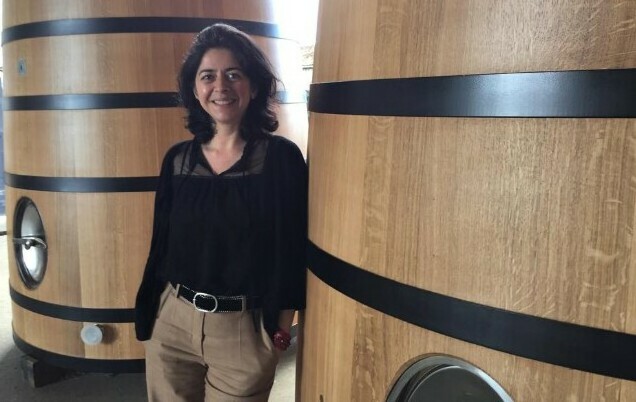
Future Prospects
G: How do you see the future?
MA : The world is in turmoil at the moment. Who knows what tomorrow will bring? I think that Seguin Moreau’s future is rooted in its past. Quite simply, we are a brand that has always innovated and produced quality. I can’t say everything, but we’re currently working on a number of innovations, which we’ll be unveiling soon, and which are completely in line with the wine.
What’s more, we’re a brand that has always listened to its customers. That’s one of the keys to our continued success. Despite the instability of today’s world, there will always be a place for a quality product that has been mastered, traced and created by people who put their heart into it. I’m not worried. I often say this to our teams, especially in these difficult times: let’s stick to our guns. We’ve been around since 1838, we’ve never given up on quality and our expertise, and we won’t give up on these issues. Even if the sector is going through disruption and adjustments are to be expected, we will find the right solutions to meet tomorrow’s challenges. We are creative and we have always delivered quality. I’m convinced that our place in the future is assured.
G: You’re also President of the Fédération des Tonneliers de France, can you tell me more about that?
MA : Yes, I’m honoured. It’s important to get together as a federation, because there aren’t very many of us. The Federation represents 57 coopers, with around ten in France. We have a small trade, but an important heritage trade. We serve an industry that is an extraordinary standard-bearer for France. We’re proud to do this job, but we have to defend it. We also need to promote our expertise. I’m proud and delighted that the coopers have asked me to carry the banner for the profession. There’s a lot to be done to break down preconceived ideas about wood.
Gerda BEZIADE has an incredible passion for wine, and possesses a perfect knowledge of Bordeaux acquired within prestigious wine merchants for 25 years. Gerda joins Roland Coiffe & Associés in order to bring you, through “Inside La PLACE” more information about the estate we sell.

